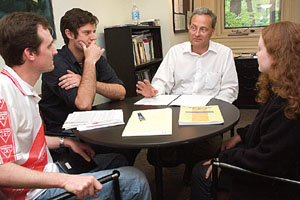Alan Kolata, The Neukom Family Distinguished Service Professor in Anthropology and the College
By William HarmsNews Office
 Professor Alan Kolata (second from right) meets with students Zach Chase, Steven Kosiba and Jennifer Schaffer. | |
In his graduate student courses, Alan Kolata trains aspiring archaeologists to develop their own interpretations of ancient cultures, even if that means challenging his interpretations.
“I’ve had students in the field who, in the process of doing their own research, come up with conclusions that modify or contradict mine. I think that’s fine. It shows that they’ve learned to think for themselves,” says Kolata, the Neukom Family Distinguished Service Professor in Anthropology and the College and Chair of Anthropology.
One of the challenges to Kolata’s work came from a student who worked with him on research at Tiwanaku in the high Andes of Bolivia. Kolata had concluded from his earlier work that an ancient irrigation system was developed by a strong, centralized political authority.
“I had a student who did further work in the region and developed a different explanation. He was able to show that there was greater local autonomy in the management of the ancient systems, and as a result, I ended up modifying my perspective,” Kolata explains.
In addition to teaching graduate student archaeologists to be independent thinkers, Kolata also prepares the students to work with local officials and write their own grants— skills they will need to be successful as academic researchers.
“It’s really a collaborative enterprise,” says Kolata. “I don’t assign them specific projects to do, as is often the case in large, interdisciplinary research projects. Instead, I expect my graduate students to define their own research problems. We develop a dialogue in the field as they become experts on their topics and begin to take ownership of the problem they are studying.”
Kolata also guides them in learning the diplomacy needed in the field to be able to work well with local officials and people living in nearby communities, where teams conduct their research.
“One of the things that’s absolutely important is to learn the local language,” says Kolata. “In South America, that’s not so much of an issue because Spanish is widely understood, and many of our students know Spanish,” he explains.
Kolata, who currently is conducting research at the Angkor temple complex in Cambodia, will undergo the same kind of language-learning experience in the next few months when he studies Cambodia’s Khmer language. Traveling with Kolata will be the first American graduate students to do archaeological work at the world heritage site of Angkor.
The students will excavate a hospital that was built in the 12th century A.D. The site was one of a series of hospitals built by a king who embraced a particularly compassionate form of Buddhism.
“The medical treatment at the time incorporated diagnostic and therapeutic practices from China as well as India,” Kolata says. The team hopes to find texts and other material evidence of the healing practices of the time.
Kolata joined the Chicago faculty in 1987, after serving on the faculty of the University of Illinois at Chicago. He received a B.A. in anthropology from Marquette University in 1973 and a Ph.D. in anthropology from Harvard University in 1978.
![[Chronicle]](/images/sidebar_header_oct06.gif)